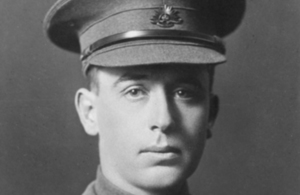WW1 Australian VC recipient Rupert Vance (Mick) Moon
The story of Australian First World War Victoria Cross recipient Rupert Vance (Mick) Moon.

Rupert Vance (Mick) Moon [Credit: Australian War Memorial A02592]
66 men from Australia received the Victoria Cross, Britain’s highest award for gallantry, during the First World War. As part of the Centenary Commemorations the people of the United Kingdom marked their gratitude to those courageous men by presenting a bronze memorial plaque to their home country engraved with their names. The plaque is now displayed at the Australian War Memorial. This archive tells their stories.
Name: Rupert Vance (Mick) Moon
DOB: 14 August 1892
Place of Birth: Bacchus Marsh, Victoria, Australia
Date of Action: 12 May 1917
Place of Action: near Bullecourt, France
Rank: Lieutenant
Regiment: 58th Battalion, Australian Imperial Force
Rupert (Mick) Moon was born on 14 August 1892 in Victoria, Australia. He was a bank clerk and in the militia (now the Australian Army Reserve) before enlisting in the Australian Imperial Force in August 1914 as a trumpeter. Moon set sail in October of that year for Egypt and served in Gallipoli from May 1915 until evacuation in December. He was promoted to Sergeant and left for France. He was subsequently appointed Platoon Commander in the 58th Battalion to replace recent losses.
Lieutenant Moon was awarded the Victoria Cross for most conspicuous bravery on 12 May 1917 when he led his men in the successful breaching of the Hindenberg Line in the Second Battle of Bullecourt. Moon personally led the assault, and was wounded four times. As his citation in the London Gazette explains:
Although wounded in the initial advance, he reached his first objective. Leading his men against the trench itself, he was again badly wounded and incapacitated for the moment. He nevertheless inspired and encouraged his men and captured the trench. Lt. Moon continued to lead his much diminished command in the general attack with the utmost valour, being again wounded, and the attack was pressed home. During the consolidation of the position, this officer was again badly wounded, and it was only after this fourth and severe wound through the face that he consented to retire from the fight. His bravery was magnificent, and was largely instrumental in the successful issue against superior numbers, the safeguarding of the flank of the attack and the capture of many prisoners and machine guns.
Badly wounded, Moon was sent back to Australia to recuperate, but he bravely volunteered to return to active service in France and ended the war as a temporary captain. Afterwards, Moon worked in a bank and as an accountant. He died in 1986 at the age of 93.